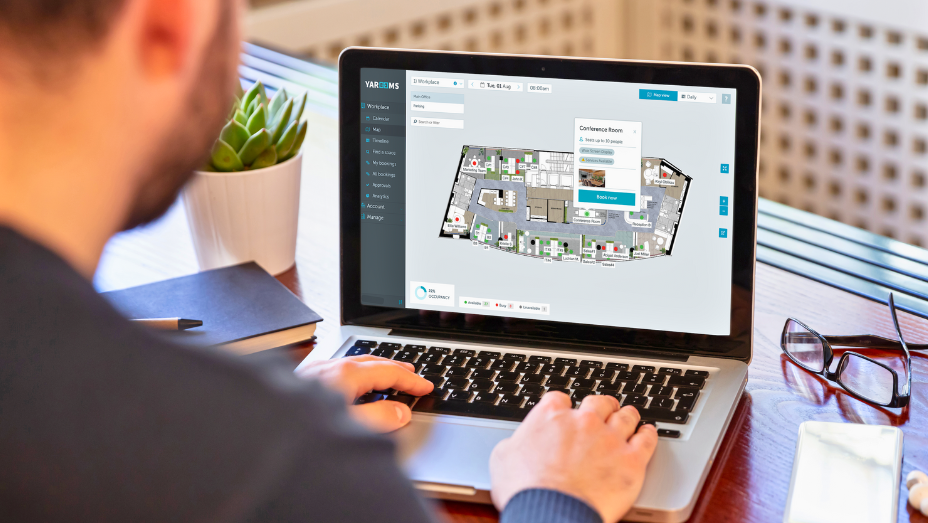In today's dynamic and competitive business environment, companies constantly seek innovative ways to cut costs while simultaneously boosting productivity. A desk sharing policy is one of those strategies landing squarely on the corporate radar. It seems simple, but it's drastically reshaping how organizations operate and manage their office spaces.
TL;DR:
- Desk sharing involves employees using shared desks rather than designated individual workstations, reshaping how organizations operate and manage shared office spaces.
- Desk sharing policy can lead to financial savings, increased creativity, and is practical for remote and hybrid working trends.
- Desk sharing revolves around employees sharing desks based on need, and there are distinctions between shared desk, hoteling, and hot desking.
- Benefits of having a shared desk policy: increased efficiency, cost savings on shared office space, flexibility, collaboration opportunities, improved communication, and teamwork are some of the benefits.
- Implementing a desk sharing policy in the workplace involves assessing office space, developing a desk sharing policy, implementing a desk reservation system, and communicating the change to employees through training and workshops.
- Best practices for effective desk and office sharing: provide adequate storage solutions, promote cleanliness and organization, offer adjustable ergonomic equipment and amenities, create quiet areas for focused work, encourage work in collaboration spaces (like meeting rooms), and use technology tools for reservations and tracking.
- Addressing privacy concerns, managing personalization of workspaces, and dealing with cleaning and maintenance are critical challenges that require strategic solutions.
Introduction to Desk Sharing Policy in Coworking and Shared Workspaces
What is a Desk Sharing Policy?
Simply put, a desk sharing policy is where employees use shared desks rather than designated individual workstations. It's less formal than an assigned seating arrangement, offering greater flexibility for adjustability to various individuals' needs and optimizes real estate usage. However, this scheme demands that employees adapt by becoming more mobile and embracing digital tools for remote working or hot desking systems.
Coworking spaces and shared office spaces take this concept further by providing an ideal environment for freelancers, digital nomads, startups, entrepreneurs, and remote workers. These spaces offer private offices and flexible seating options, allowing professionals to collaborate and share resources while maintaining independence. With a desk sharing policy, members can enjoy the benefits of a professional workspace without the long-term commitment, fostering a community where innovation and creativity thrive.
Importance of Implementing a Desk Sharing Policy
Adopting a desk sharing policy could prove integral to your company's success in numerous ways.
First, from the financial perspective, having fewer desks means diminishing overheads– furniture or real estate costs– and providing significant savings. On top of that, flexible working arrangements spark creativity, facilitating increased collaboration among colleagues from differing disciplines.
Furthermore, with the emerging trend towards remote and hybrid working, initiating a desk sharing policy appears practical and pragmatic to stay ahead in modern business landscapes.
Encapsulating these benefits makes creating an effective desk sharing policy crucially advantageous. Knowing exactly where to commence can appear daunting, so we'll guide you throughout this transformative journey in subsequent sections!
.png?width=928&height=523&name=Blog%20post%20photos%202%20(8).png)
Understanding Desk Sharing
As we dive deeper into the modern approaches that workplaces adopt, it is key to comprehend what desk sharing entails. Armed with this understanding, you'll be better equipped to assess whether or not it's a viable solution for your office space.
Definition of Desk Sharing
As the name suggests, desk sharing revolves around employees sharing desks instead of owning a permanently assigned workspace. It's a practical approach used in dynamic work environments where all workstations do not necessarily need to be occupied at all times. An employee uses a workstation when needed and leaves it vacant when their tasks for the day are completed so another team member can utilize the same space during their shift.
Distinction between Shared Desk, Hoteling, and Hot Desking
Even though these terms - shared desk, hoteling, and hot desking - seem interchangeable, specific nuances set them apart.
- Shared Desk: This concept implies that two or more employees share a single desk but operate in different shifts. So, while the physical workspace is shared, everyone has time-exclusive access.
- Hoteling: Remember booking hotels? That's what happens here. Staff members reserve desks for specified periods using a desk booking system. This strategy is popular among companies with teams working on distinguished schedules or projects, reducing the possibility of overbooking.
- Hot Desking: Quite analogous to jumping onto whichever seat is free on a bus journey! Employees pick any available workspace upon arrival at the office without making bookings in advance, leading to spontaneous allocations.
Each approach caters to specific needs within an organization structure, and training should be conducted accordingly once your company decides which type best matches its modus operandi. Understanding of how diverse workplace sharing strategies vary paves the way towards implementing them effectively.
Benefits of Having a Desk Sharing Policy
Among the various elements that have shaped today's modern office environment, few are as transformative and impactful as the concept of office space sharing.
Implementing a desk sharing policy doesn't just modify how you arrange your furniture; it completely reformulates the dynamics involved in managing an office environment. It represents a shift in workspace organization and ushers in several considerable benefits and advantages.
Increased Efficiency and Productivity
Adopting a desk sharing policy boosts productivity by promoting flexible work environments tailored to tasks and preferences. This approach breaks conventional cubicle boundaries, encouraging efficient use of shared space and resources. Employees benefit from increased motivation and job satisfaction, selecting environments that suit their needs.
Organizations embracing shared office spaces report heightened energy, fostering trust and collaboration. Interactive opportunities during team collaborations lead to increased cooperation among staff, propelling operational efficiency upward.
Cost Savings on Office Space
From a cost-effectiveness perspective, implementing a desk sharing policy is a savvy money-saving tactic for businesses. Inefficiencies often arise from underutilized desks and workspaces, especially in hybrid work settings.
Comprehensive desk sharing policies address this problem by maximizing workstation usage through redistribution among employees with different work shifts or hybrid schedules. This significantly reduces overhead costs related to renting or acquiring larger spaces to accommodate growing teams, offering substantial savings for businesses.
Here's a real-life example for you: back in 2021, Dedalus, the leading healthcare IT provider in Europe (and one of the largest in the world), relocated its office in Vienna to a new building with a smaller office space.
The assigned seating culture was prominent in Vienna's office: before the relocation, most employees had dedicated desks or private offices. At the same time, the company was actively recruiting, and the team rapidly grew from 200 to 300 employees.
What to do when you do not have enough desks for everyone?
Dedalus decided to implement a desk sharing policy. With the help of the YAROOMS desk booking solution, they were able to ensure a smooth transition, efficient operations, and generate cost savings from a downsized office space.
Watch the Dedalus success story:
Flexibility and Collaboration Opportunities
Desk sharing promotes flexibility, aligning with the preferences of today's workforce that values diverse work arrangements. A flexible shared desk environment caters to various working styles.
Furthermore, instead of isolating teams or departments, office sharing turns the workspace into collaborative hubs that foster forward-thinking and innovation. Cross-functional collaboration opportunities stimulate interpersonal interactions, sparking interdisciplinary creativity. This leads to workshops buzzing with ideas and workplaces humming with synergy.
Improved Communication and Teamwork
Typically, compartmentalized office layouts can lead to siloing - where communication gets trapped within isolated units, not fostering healthy information flow throughout the organization. Bustling shared offices, on the contrary, makes it harder for communication blockages to form.
Desk sharing policies bolster formal and informal internal communications by encouraging employees from varied backgrounds or departments to interact regularly during daily tasks. This constant exchange of thoughts significantly improves solidarity between staff members, directly impacting teamwork positively across the organization.
Remember, a robust desk sharing policy is not just logistics—it shapes your company's culture, instills flexibility, and spurs collaboration within your organization, making it an invaluable addition to any progressive workspace focused on maximizing efficiency.
Implementing a Desk Sharing Policy in the Workplace
Implementing a desk sharing policy within the office involves many moving parts and requires careful planning. There are pivotal steps to ensure seamless implementation that fosters maximum office efficiency.
Assessing Office Space and Availability
Evaluating Current Workspace Layout
The first critical step in implementing desk sharing at work involves assessing your current workspace layout. You must examine the dimensions, structure, furnishings, amenities, light sources, power outlets, and IT infrastructure. The aim is to find parts of the workspace that can become flexible shared desks while keeping employee comfort and work functionality in mind.
Identifying Space for Shared Desks
Post evaluation, spot potential areas that may serve as communal spaces for shared office desk setups. These could be vacant rooms, underutilized common locations, or even private offices turned into more flexible environments. Transitioning these identified spaces into productive shared workstations aids effective office desk sharing.
Developing a Desk Sharing Policy
Implementing a Desk Reservation System
Emphasizing predictability while creating a sense of order among employees is paramount. Hence, you'd have to put a reservation system in place to help manage office sharing etiquette effectively.
Technology tools such as YAROOMS desk booking software can simplify this process, allowing staff members to reserve desired desks on specific days or time frames in advance. Moreover, with solutions like YAROOMS, you can assign configurable properties (dual monitor, standing desk, etc.) to each desk so that employees can find the perfect seat for their needs.
Additionally, a modern desk booking system will provide access to workplace analytics so you can understand how your team interacts with the office and make the most of it.
Designating Desk Zones or Neighborhoods
Further, organize your workplace by designating zones or office neighborhoods according to team alignment, the nature of tasks involved, or noise levels. Like-minded individuals tend to thrive when working together, sparking creativity, fostering teamwork, and enhancing productivity.
Establishing Rules for Shared Desk Etiquette
Proactively tackle cleanliness concerns by establishing explicit guidelines for tidiness and organization at every shared workstation. This ensures that maintenance seamlessly aligns with daily operations once your desk sharing policy is implemented.
Communicating the Change to Employees
Informing Employees about the New Policy
Announce the shift in person, via email, or at team meetings, and do so engagingly and openly. Cover the benefits of desk sharing at work to excite employees about the new desk sharing policy. Be ready to answer preliminary questions that may arise and assure them they will be adequately equipped with the skills needed for this change.
Conducting Training or Workshops on How To Use Shared Desks
Training provides staff members with effective coping mechanisms during transition periods like these. Coordinating workshops on usage guidelines of shared office desks and reservation systems eases their anxieties and stamps out confusion before it arises.
Best Practices for Effective Desk Sharing
Providing Adequate Storage Solutions
One of the essential components in implementing a successful shared desk policy is providing sufficient storage solutions. In an environment with communal work desks, personal items can quickly clutter the workspace if there are no designated spaces to stow them away. Lockers or mobile pedestals could accommodate employees' belongings, thus maintaining tidiness within the shared space.
Promoting Cleanliness and Organization at Shared Desks
Along with offering adequate storage options comes the need to promote cleanliness and organization at each shared workstation. To ensure that each team member feels comfortable and productive when using a shared desk, it's crucial to require respect for common areas. Establishing cleaning schedules, encouraging employees to clear their workstations after use, and developing a neatness-centric ethic (aka 'shared desk etiquette') should form part of your company's culture.
Offering Adjustable Ergonomic Equipment
Workplace comfort contributes significantly to productivity. Therefore, providing adjustable ergonomic equipment as part of your shared desk space allocation strategy is imperative. Including height-adjustable desks, modular chairs with excellent lumbar support, and flexible monitor stands can make employees feel more comfortable while addressing health concerns related to long sitting hours.
Creating Quiet Areas for Focused Work
Your team will inevitably have individuals who perform best in quiet environments, along with those who thrive amidst background noise. Creating designated quiet zones and more personal office spaces can help meet everyone's needs effectively without hampering any person's significant contribution. Ensuring these areas are fitted with individualized working stations could enhance critical thinking and problem-solving abilities amidst noise-sensitive staff.
Encouraging Collaboration Spaces
A thoughtfully arranged communal work desk setup should not only support individual task completion but also foster teamwork. Striking a balance between collaborative spaces and focused working areas effectively caters to diverse workers. Integrating open-plan layouts featuring larger tables promotes brainstorming sessions and facilitates collaborative efforts for tasks requiring collective input.
Managing Noise Levels in Shared Spaces
Noise distractions may arise from discussions, phone calls, or even equipment operations. Actively managing these disruptions ensures conducive working environments for everyone involved. Consider implementing ‘quiet hours,’ utilizing space dividers or soundproofing materials to help control noise without losing collaboration benefits.
Using Technology Tools for Reservations and Tracking
Technology plays a significant role in streamlining desk sharing arrangements. Online booking systems allow employees to reserve desks as needed, ensuring efficient utilization of available space. Digital apps capable of tracking workspace usage patterns offer valuable insights into how shared spaces utilized can aid in planning future improvements.

Overcoming Challenges in Implementing a Desk Sharing Policy
By acknowledging and addressing these potential hurdles head-on, you can formulate effective solutions permitting smooth implementation of your desk sharing policy. This section addresses three critical obstacles: privacy concerns, workspace personalization, and cleaning and maintenance.
Addressing Privacy Concerns
When transitioning to shared desks or adopting a hoteling policy, privacy issues invariably rise to the top of employee concerns. Here are some strategic steps you might consider:
- Install partitions or dividers between desks to create private work zones without sacrificing the landscape's open feel.
- Utilize noise-cancellation features like sound masking devices or dedicated quiet rooms for focused work.
- Develop a clear usage policy emphasizing respect for others' space and privacy.
Make sure to listen to your employees' feedback about their sense of privacy after implementing these solutions—it could become invaluable as you adjust your tactics moving forward.
Managing Personalization of Workspaces
Employees tend to personalize their regular workstations with photos, plants, or other sentimental items, which provide comfort and motivation throughout the day. However, personalized spaces must often be clarified within a desk sharing context since they must transition between workers seamlessly.
To address this hurdle:
- Provide individual lockers where employees can store their personal belongings when not in use
- Designate specific areas where teams can display motivational items collectively
- Encourage workers to bring small portable items they can easily take when leaving their shared space.
Remember that flexibility doesn’t mean impersonal—there’s room for character in a communal office setting!
Dealing with Cleaning and Maintenance
Regular cleaning activities assume increased significance under a shared desk regime due to frequent usage by multiple individuals round the clock, leading to quicker wear and tear apart from hygiene considerations.
To curb these challenges:
- Devise a clear etiquette guide that specifies cleanliness expectations.
- Include short-term cleaning duties as part of your shared-desk usage policy—things like wiping down surfaces at the end of a work session.
- Partner with an efficient office cleaning service for regular and deep cleaning routines
Implementing such strategies can ensure that every employee arrives at a clean workstation, fostering increased productivity and satisfaction while sharing an office with coworkers. With patience and careful planning, you'll find overcoming these challenges achievable and beneficial in your journey toward maximizing workspace efficiency.
Frequently Asked Questions about Desk Sharing Policy
This section will address crucial questions about shared workspace ideas and desk sharing policies.
How Does Desk Sharing Improve Workplace Efficiency?
Desk sharing can lead to increased workplace efficiency through various ways:
- Maximizing Space Usage: A smaller office reduces wastage stemming from underutilized spaces.
- Promoting Collaboration: An open layout often sparks creativity and team engagement by breaking down hierarchical or departmental silos.
- Flexibility: Offering different work areas (quiet zones for focused tasks, collaboration areas for group projects, etc.) cater to varying work styles, bolstering productivity.
- Cost Efficiency: A smaller space means lower utility bills or rental costs.
How Can Employees Reserve or Book a Shared Desk?
As desk sharing becomes more common in organizations worldwide, there are user-friendly tools like online desk booking solutions (such as YAROOMS) to simplify reservation processes. These platforms or apps typically feature interactive floor plans (office maps), displaying the availability of shared desks. Employees can easily select their preferred date and time slot and click 'Reserve.' It's important to always check your company's specific desk booking protocols.
What Rules Should Employees Follow for Shared Desk Etiquette?
In a shared workspace setup, focus on the golden rule: treat the desk with respect and courtesy, just as you would wish others to treat it. Some standard etiquette rules include:
- Ensuring cleanliness by clearing up after use.
- Honoring reservation timing without overstaying.
- Refraining from personalizing shared desks excessively.
- Keeping noise levels down in consideration of others.
Companies might have detailed guidelines; consult your organization's policy document.
%20(1)-1.png?width=928&height=523&name=Blog%20post%20photos%202%20(18)%20(1)-1.png)
Are There Any Drawbacks to Implementing a Desk Sharing Policy?
Like any workplace initiative, implementing a desk sharing policy comes with potential drawbacks. Challenges may arise concerning the lack of personalization and privacy – some employees value personalized spaces that contribute to their comfort at work. Effectively managing this change is a crucial task for leadership teams. Additionally, implementing rigorous cleaning protocols is necessary to uphold hygiene standards.
Despite these challenges, studies suggest that the benefits associated with desk sharing often outweigh potential drawbacks significantly.
Can Desk Sharing Create Problems Between Employees?
Desk sharing can potentially create problems between employees. Sharing desks may lead to disputes over space, cleanliness, and varying work habits. Additionally, the need for a dedicated personal space can impact concentration and productivity for specific individuals.
Effective implementation of desk sharing policies requires clear communication, guidelines, and efforts to address these concerns. Leadership teams must proactively manage the transition to desk sharing, ensuring that employees' needs for comfort and privacy are considered to minimize conflicts in the shared workspace.
How to Tell a Coworker to Clean The Shared Desk?
Approaching a coworker about cleaning the shared desk requires tact and consideration. Start by choosing an appropriate time and setting, such as during a break or private space. Use a polite and non-confrontational tone, expressing your concern constructively. For example, you might say, "Hey [Coworker's Name], I hope you're doing well. I noticed that the desk area could use a bit of tidying up, and I thought it might help create a more organized and comfortable workspace for everyone. Is there anything I can do to assist or any specific reasons for the current arrangement?" This approach encourages open communication and collaboration rather than creating a confrontational situation.
Summing It Up
Adopting desk sharing policies is not only beneficial but imperative in today's fast-paced work environment. It brings heightened efficiency, productivity, and substantial cost savings. This shift fosters flexibility, communication, and team spirit.
Implementing an effective policy involves evaluating your workspace, setting up reservation systems, and defining shared desk etiquette. Challenges such as privacy concerns and cleaning procedures may arise, but addressing them leads to empowering transformations.
Effective communication and education are essential during this transition. Providing ergonomic equipment and storage solutions maintains organization, contributing to a successful desk sharing policy. Emphasizing collaboration spaces and managing noise levels ensure productivity flourishes in this dynamic workplace, personifying efficiency at its best.












